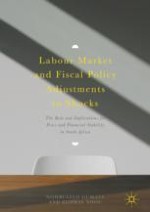2017 | OriginalPaper | Buchkapitel
7. The Minimum Wage, Income Inequality and the Price-Stability Mandate
verfasst von : Nombulelo Gumata, Eliphas Ndou
Erschienen in: Labour Market and Fiscal Policy Adjustments to Shocks
Aktivieren Sie unsere intelligente Suche, um passende Fachinhalte oder Patente zu finden.
Wählen Sie Textabschnitte aus um mit Künstlicher Intelligenz passenden Patente zu finden. powered by
Markieren Sie Textabschnitte, um KI-gestützt weitere passende Inhalte zu finden. powered by
